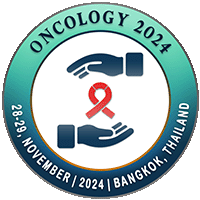Track: Cancer Therapy and Research

Sub-Track:
Cancer therapy and research are
integral components of the ongoing battle against cancer. Cancer therapy refers
to the various treatment modalities used to combat cancer and improve patient
outcomes. These treatments may include surgery, radiation therapy, chemotherapy,
targeted therapy, immunotherapy, and hormone therapy, among others. The goal of
cancer therapy is to eradicate or control the growth and spread of cancer cells
while minimizing damage to healthy tissues. Cancer research plays a critical
role in advancing our understanding of cancer biology, identifying new
therapeutic targets, and developing innovative treatment strategies.
Researchers continuously investigate the underlying mechanisms of cancer
development and progression, seeking to uncover vulnerabilities that can be
exploited for therapeutic purposes. They explore novel drug compounds, develop
targeted therapies that specifically attack cancer cells, and enhance existing
treatment modalities to improve efficacy and reduce side effects. Clinical trials are a crucial
component of cancer therapy and research. These trials evaluate the safety and
effectiveness of new treatments or treatment combinations in human subjects.
Through clinical trials, researchers gather valuable data on treatment outcomes,
patient responses, and potential side effects. This data helps shape
evidence-based guidelines for cancer treatment and informs future research
endeavors. Cancer therapy and research also
focus on personalized medicine approaches. Personalized medicine takes into
account individual patient characteristics, such as genetic profiles, tumor
markers, and treatment responses, to tailor treatment plans to the specific
needs of each patient. This approach improves treatment efficacy, reduces
unnecessary treatments, and minimizes adverse effects. Furthermore, survivorship and
supportive care are integral aspects of cancer therapy. Survivorship programs
aim to address the physical, emotional, and psychosocial needs of cancer
survivors, providing guidance on long-term care, managing treatment-related
side effects, and promoting a healthy lifestyle. Supportive care includes
palliative care, pain management, psychological support, and nutritional
support, among other services, to enhance the quality of life for patients
undergoing cancer treatment.
SUBTOPICS:
·
Cell Transplant
·
Synthetic lethality
·
Angiogenesis inhibitors
·
Nano-medicine Therapy
Scientific Highlights
- Field of Oncology
- Cancer Cell Biology & Genetics
- Cancer Imaging Techniques
- Diagnosis & Treatment of Cancer
- Advances In Cancer Research And Treatment
- Cancer- Types and Causes
- Breast Cancer
- Blood Cancer
- Head/ Neck Cancer
- Neuro-Oncology
- Skin Cancer
- Pelvic Cancer
- Cancer Immunology
- Oncology Nursing and Care
- Cancer Stem Cells
- Women Health Issues and Policies
- Cancer Drugs Market
- Cancer Therapy and Research
- Survivorship After Treatment
- Personalized Medicine

